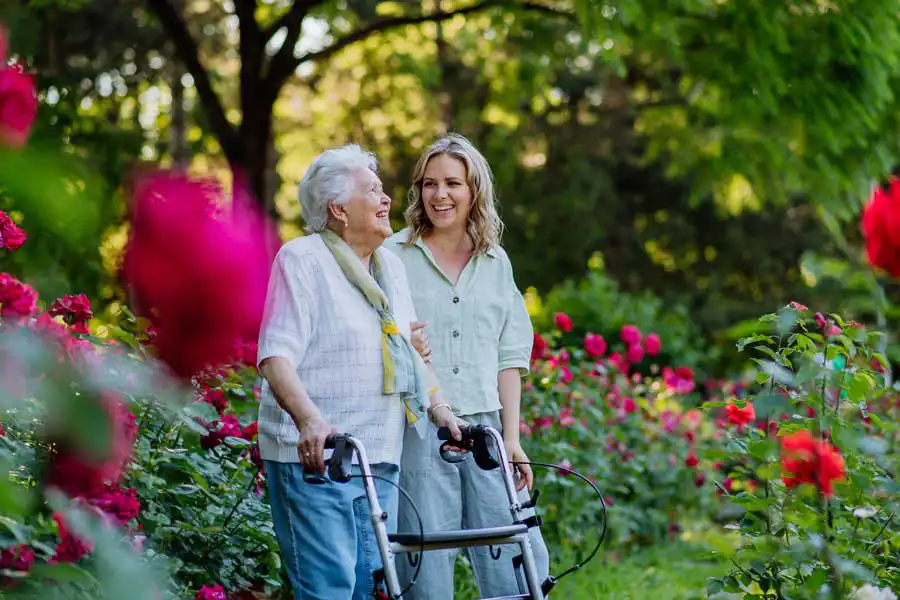Being objective and recognizing when you need additional support can be tricky if you’re a family caregiver for a senior parent or loved one. With so much time spent focusing on your relative’s health and happiness, you may fail to notice that your mental and physical well-being is suffering.
In the summer months, when many of us have a slightly busier social schedule, you might notice the impacts of your role as a family caregiver more acutely. Here are some of the most common physical, emotional, social, and practical effects of caregiving that might indicate you need support.
Physical
If your role in providing senior care for a loved one is becoming more demanding, you might experience some physical symptoms. Perhaps you’ve noticed you’re getting sick more frequently than usual – catching every cold and flu virus. Or you might feel particularly drained and exhausted, with little energy to give.
Other possible symptoms include changes to your appetite (under or overeating) and difficulty relaxing or sleeping. You know your ‘normal’ best, and if you’re feeling less physically fit and healthy than usual, it’s worth considering whether your caregiving responsibilities may contribute to this.
Emotional
Many family caregivers also find that caregiving affects their mental health, mainly if their loved one’s needs are overwhelming. For example, you might experience increased anxiety levels (perhaps worrying about your loved one’s health and safety when you’re not around). Feelings of depression, hopelessness, guilt, and even poor concentration can also indicate that you would benefit from some assistance.
You may even feel irritable or resentful towards your loved one, gaining less satisfaction from caregiving than you once did. While this can be extremely difficult, it’s a common response to the stresses of being a family caregiver. Feeling stressed is not a sign of failure or anything to feel guilty about but simply an indication that a bit of support might be helpful.
Practical
Practical challenges are often the root cause of other physical and emotional difficulties for family caregivers. If your loved one’s health is declining and they’re less able to care for themselves, you might spend more time with them than you can genuinely afford.
For example, your loved one can no longer get dressed in the morning or shower independently, meaning you must visit them much more often. Or if their mobility is declining, you must check in on them multiple times daily to ensure they haven’t had a fall or accident.
These changes to your routine may lead to other issues like irritability, feelings of helplessness, lack of social life, or poor sleep. If your loved one needs a level of practical support you can no longer provide safely, you may also put yourself at risk of injury.
Social
It’s not uncommon for family caregivers to feel cut off and isolated from the friends and family members they usually spend time with. As your loved one’s care becomes more demanding, issues like exhaustion, lack of time, or anxiety may make socializing even more challenging.
Social isolation can harm physical and mental health, contributing to loneliness, depression, reduced cardiovascular functioning, and poor immunity. Therefore, access to a great support system is vital for family caregivers, and enlisting additional help with caregiving can help facilitate this.
How Can A Residential Assisted Living Community Help?
If one or more areas of your life are adversely affected by being a family caregiver, it is worth looking into options for extra support. This support may be from friends and family members or a residential senior care or assisted living community.
Moving to assisted living combines the benefits of independent living and 24/7 care with residents living in either their apartment or a senior residential care home. In this format, seniors may have a private or shared bedroom and bathroom, plus access to communal living and dining spaces.
Moving to Silverleaf Eldercare
Silverleaf Eldercare residents live in a family-oriented, small home setting, making the transition to senior living as smooth as possible. Within our bright, modern, and comfortable homes, residents can access 24/7 person-centered care while enjoying engaging activities like yoga, karaoke, bowling, and delicious chef-prepared meals.
With a senior loved one’s needs met, family caregivers can step back from the pressures of being responsible for their loved one’s care. When your parent or relative moves to Silverleaf Eldercare assisted living, you can regain that all-important balance, addressing other commitments and enjoying more free time.
In addition, all the time you spend with your senior loved one will be time to enjoy as a son, daughter, or close relative rather than as a family caregiver. Our small senior living community is incredibly close-knit, allowing you to forge great friendships with our caring staff and other family caregivers. With these new opportunities, you can build a supportive social circle that truly understands what it means to be a family caregiver.
To find out more about how our unique senior residential care community can meet your and your loved one’s needs, get in touch today to schedule a visit.

